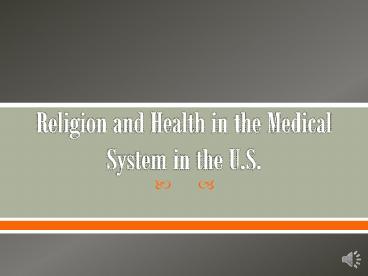Religion and Health in the Medical System - PowerPoint PPT Presentation
Title:
Religion and Health in the Medical System
Description:
education – PowerPoint PPT presentation
Number of Views:311
Title: Religion and Health in the Medical System
1
Religion and Health in the Medical System in the
U.S.
2
Module Objectives
- 1. We will summarize selected research literature
on spirituality and health in modern Western
medicine - 2. We will examine health care system responses
to religious and cultural diversity - 3. We will describe the religious/cultural/social
factors that affect health equity and risk for
disease
3
Research Literature on Religion/Spirituality
Health
4
Research Interest Increased 1990s to 2015
Greater attention paid to religious values,
beliefs, and practices as key aspects of
patient care in line with health care
accreditation rules and quality efforts
Growing recognition among health care
providers and researchers of religions
role in health behaviors and health care
decision making Research continues to
accumulate significant results showing that
patients spirituality/religiosity may be
important to medical outcomes
5
Current Literature Addresses Religion/Spiritualit
y as
- a foundation for religious social support
- a basis for personal meaning-making (a way to
understand illness and cope with the effects) - a context for behavior that can influence the
- way the body works (e.g., meditation that can
- affect physiological reactions to stress)
6
Theoretical Model of How Religion Affects
Physical Health --adapted from Koenig, et
al., Hand- book of Religion and Health,
2001 Religion also
affects Childhood Training, Adult Decisions, and
Values Character which then in turn affect
mental health, social support, and health
behaviors.
Stress Hormones
Infection
Mental Health
Cancer
Immune System
R E L I G I O N
Heart Disease
Hyper- tension
Social Support
Autonomic Nervous System
Stroke
Stomach Bowel
Disease Detection and Treatment Compliance
Health Behaviors
Liver Lung
Accidents STDs
High Risk Behaviors (smoking, drugs)
7
Health Care System Response to Religious and
Cultural Diversity
- Spiritual Care and Elimination of Health Inequity
8
Concepts in Spiritual Care
- Dignity
- Compassion
- Healing/curing
- Personhood
- Belief
- Ritual
- Hope
- Disease/illness
- Health/wholeness
- Suffering
- Coping
- Spiritual distress
- Spiritual pain
- Meaning making
9
Benefits to Patients and Organizations
- Patient satisfaction/family satisfaction
- Decreased use of heroic end of life
interventions/increased use of palliative care - Increased quality of life
- Increased compliance with treatment
- Decreased pain
- Creates a culture of compassion
10
Spiritual Assessment Tools
- FICA
- HOPE
- H - patient sources of hope
- O participation in organized religion
- P- personal spiritual practice
- E- effect of belief on medical and end of life
issues - Anandarajah, G. Hight, E. (2001). Spirituality
and Medical Practice Using the HOPE Questions as
a Practical Tool for Spiritual Assessment. America
n Family Physician. 63 (1), 81-89
- Faith importance of faith or spirituality
- Impact - on health choices and beliefs about
illness - Community available support systems
- Assist - desired assistance from provider
- (Puchalski CM. (1999). Taking a spiritual
history FICA. Spirituality Medicine
Connection. 31)
11
- Hospital Chaplains
- http//video.pbs.org/video/1641748717/
- https//www.youtube.com/watch?vqHkm6NiDQ1Y
- https//www.youtube.com/watch?v1EkqhrDXbKk
12
Health Inequities and Disparities What Does
that Mean?
- Differences
- Different outcomes
- caused by
- Biology
- Preferences
- Access
- Insurance
- Resources
Disparities Unexplained
differences in outcomes associated with race
or ethnicity
Unequal healthcare
S. Ryan Greysen, M.D., M.A Bruce Siegel, M.D.,
M.P.H
13
Achieving Health Equity
- Even though recognized, not improving so
- Data Collection and Quality Initiatives
- Training for Health Care Providers
- Medical School Curriculum
- What is Culturally Competent Healthcare?
https//www.youtube.com/watch?vE4k8YWqkjqo - Health Equity Scholars https//www.youtube.com/wat
ch?vJ6n2ZMRMyIE































